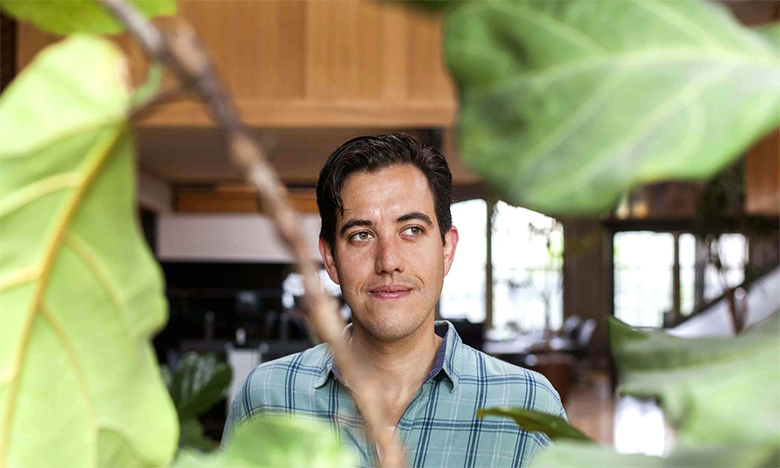I know what finance bros look like: the bespoke suit, the Paul Stuart tie, the well-shined shoes. Ryan Smith, with his mop of shaggy, wavy hair, in blue jeans and a no-label blue shirt, does not fit the type.
I point out the disconnect. “I do not wear a suit,” he laughs. But he knows what I mean — he stands out from the guys he works with.
We’re sitting in Smith’s San Francisco office, the headquarters for Chain, a fintech company where the 30-year-old falls decidedly on the tech side. Chain’s backed by millions of dollars from Nasdaq, Citibank, Visa, futurist Peter Diamandis and the former CEO of Bank of America, totaling its value at some $150 million. Even in the finance world, that’s a respectable lump of cash. “[The traditional financial world] senses that this could be something really big and it could fundamentally disrupt their business,” says Campbell Harvey, professor of finance at Duke University. “It’s better to be in early than not to be in at all.”
The man leading the technological innovation is Smith, who, as the CTO of Chain, is essentially Wall Street’s plumber, changing the pipes on how asset transactions flow — stocks, bonds, you name it — by diminishing the role of middlemen. His fundamental idea is to digitize the world’s assets. Today, financial services sit on an antiquated stack of technologies. Chain builds infrastructure technology for financial institutions to use blockchain (the underlying technology of bitcoin), licensing it so transactions will be run on a decentralized, encrypted ledger. The result: more transparent transactions, faster and cheaper — Smith would even be able to guarantee they’re non-fraudulent. The work’s already being tested by Nasdaq and Visa and may one day be the infrastructure used by us layfolk — and Chain recently published open source protocols, allowing anyone else to build their idea.
Smith speaks Midwestern-slow, and as much as we talk about Wall Street and technology, we also converse about solving “problems for the masses.” He manifests as a mindful Silicon Valley version of money, presenting himself on his coder’s profile with a Robert Heinlein quote about how human beings shouldn’t feel the need to specialize (right above a few blog-vignettes referencing the miracles of Jesus and that time he met, laughed and prayed with a homeless kid in Golden Gate Park). I tell him that reminds me of Karl Marx and he nods. He says he’s just been “thinking about what it means to be human.”
“Software isn’t the end all, be all,” says the guy who founded two such companies while in college at the University of Missouri–Kansas City. And people agree, he doesn’t strike you as an engineer on first guess. “You might think he’s a manager or a consultant or a salesperson,” co-founder Adam Ludwin says. Smith doesn’t care for apps and every morning, he journals in a nearby coffee shop at 6:30 or 7 a.m. He loves drinking whiskey and riding his 1973 Harley-Davidson. He’s also into musing about — but not actually — going back to farming.
Such thinking befits his Kansas City roots; he grew up going to his grandparents’ farms fiddling with CB radios, the kind truckers use. He was a “reckless” high schooler, he says, kicked out of private school and sent public, to his parents’ chagrin. He loved fireworks and pranks, and “parents weren’t always happy their kids were hanging out with Ryan,” he says. Now he’s a tamer version of himself, spiritual and more productive in his rebelliousness. “I don’t turn my spirituality off when I come to the office,” he says. “I try to do the right thing, be honest with folks.” Which might position him as the perfect person to help guide a refresh of Wall Street’s culture.
If there’s any industry that could use some good press and a makeover, it’s probably the financial industry. The 2015 Makovsky Wall Street Reputation Study found that 69 percent of U.S. millennials reported a lack of trust in financial institutions. But being trustworthy is just what you’d expect from one of the other Chain founders, who started SoulPancake, a media company dedicated to helping people soul-search their way to their values (which put out the crunchiest guide to happiness ever written).
Chain is just one part of a new breed of companies and groups, such as R3, Ripple and Linux Foundation, using blockchain — similarly hyped as the cloud was years ago — for transactions. “There are many things that will be shaken up [by blockchain],” Harvey says. “It just so happens that some of the most low-hanging fruit is in the financial services.” The space is already getting competitive, with companies such as R3 also using blockchain technology.
Sure, Smith would love to reach unicorn status, but he’ll take what Chain has so far. “If we’re not a billion-dollar company but have the impact, that’s successful,” he says. They just need to get the technology in a place where everyone can use it for transactions. While some friends think Smith could become the next Michael Dell, others, including himself, see him going back to a school somewhere in the middle of nowhere to teach math. After all, for him, it’s not always about the money.

